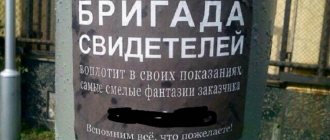ST 306 of the Criminal Code of the Russian Federation.
1. Knowingly false denunciation of the commission of a crime is punishable by a fine in the amount of up to one hundred twenty thousand rubles, or in the amount of the wages or other income of the convicted person for a period of up to one year, or by compulsory labor for a term of up to four hundred eighty hours, or by corrective labor for a term of up to two. years, or forced labor for a term of up to two years, or arrest for a term of up to six months, or imprisonment for a term of up to two years.
2. The same act, coupled with a person being accused of committing a grave or especially grave crime, is punishable by a fine in the amount of one hundred thousand to three hundred thousand rubles, or in the amount of the wages or other income of the convicted person for a period of one to two years, or forced labor for a term of up to three years, or imprisonment for the same period.
3. Acts provided for in parts one or two of this article, combined with the artificial creation of evidence of accusation, are punishable by forced labor for a term of up to five years or imprisonment for a term of up to six years.
Commentary to Art. 306 Criminal Code
1. The objective side is expressed in the form of actions to bring to the attention of law enforcement agencies deliberately false information about the criminal behavior of a certain person or persons. This information may be deliberately false regarding the fact of the commission of a crime or the person’s involvement in its commission. It can be reported both to the competent authorities authorized to decide on the initiation of criminal cases, and to the authorities and officials required to report the detection of signs of crime. Knowingly false denunciation is possible in oral, written or other form (using technical means). These actions, combined with accusing a person of committing a serious or especially serious crime (Part 2) or combined with the artificial creation of evidence of the accusation (Part 3), form qualified elements of a crime.
2. According to Article 306 of the Criminal Code of the Russian Federation, a crime is considered completed from the moment the addressee perceives knowingly false information. Part 3 also requires the artificial creation of evidence of accusation (planting a person with an object or instrument for committing a crime or his personal belongings at the crime scene, etc.); with additional qualifications under Art. 303 of the Criminal Code is not required.
3. Giving knowingly false testimony by a person who has knowingly made a false denunciation as a witness to a crime during a preliminary investigation or at a court hearing does not require additional qualifications under Art. 307 of the Criminal Code of Russia.
4. The subjective side is characterized by direct intent, implying the awareness that the information provided is false.
It's a family matter
At the beginning of October 2021, a resident of the city of Angarsk, Irkutsk region, did not come home to spend the night: he drank until the morning while visiting his new friend. His wife was waiting for the man at home, to whom he told that he had been kidnapped and extorted money. To give credibility to the plot, the unfaithful husband went to the Angarsk police department and wrote a statement about the kidnapping. After a pre-investigation check, a case was opened against him - under Part 2 of Article 306 of the Criminal Code.
A 16-year-old schoolboy from Borisoglebsk, Voronezh region, pierced his stomach with a broken bottle and reported the attack so that he would not be scolded for bad grades. The young man staged the crime when he learned that his mother was going to a parent-teacher meeting, where she would inevitably be told about his problems with his grades. The schoolboy hit himself three times in the stomach with a broken bottle, hid his phone and 150 rubles, and told the hospital and the police that he had been beaten and robbed by three unknown men. He later admitted that he had made up the story to make his parents feel sorry for him. A criminal case was opened against the teenager under Part 3 of Article 306 of the Criminal Code - the police classified self-inflicted injuries as artificially created evidence.
Narcologist from St. Petersburg, Marat Dreizin, went even further in falsifying evidence of a crime that did not happen: he shot at two bulletproof vests so that the bullets would get stuck in them, and also, under local anesthesia, used a screwdriver to push a 9-mm bullet into his shoulder. So, in the summer of 2011, Dreizin staged an attempt on himself and his security guard, which was allegedly organized by the mother of his child, Elena Korzun. Dreizin's former flame spent four months in jail before investigators realized that the assassination attempt was staged with the help of an extra. Dreizin, who had already been convicted in the past in the high-profile “case of orderlies,” was sentenced under Part 3 of Article 306 of the Criminal Code to five years in prison in a maximum security colony.
Common false accusations against family members and acquaintances include allegations of battery and rape. A resident of Kimovsk, a small town in the Tula region, said that her son threatened her with a knife during a quarrel. In court, she admitted her guilt and was fined 10 thousand rubles.
A 23-year-old resident of the Amur region explained to her husband her absence from home at night by saying that an acquaintance had raped her and did not let her out of the apartment. According to investigators, this is how the young woman decided to hide her adultery; the case was opened under Part 2 of Article 306 of the Criminal Code.
Second commentary to Art. 306 of the Criminal Code of the Russian Federation
1. Denunciation is a message in any form (oral or written), made on one’s own behalf, anonymously or on behalf of another person or through third parties, about the fact of a crime being committed. The message when denounced is false, i.e. not true. This may refer to the event of a crime or be expressed in attributing it to a specific person, in accusing a person not involved in committing an actual crime, or in a more serious crime than the one that was actually committed, etc. Falsity must cover factual circumstances, and not their legal assessment.
2. A crime is considered completed from the moment the authorities that have the right to initiate a criminal case receive a message about the commission of a crime.
3. The subjective side is characterized by direct intent.
4. The subject of the crime is a person who has reached the age of 16 years.
5. Denunciation becomes qualified (Part 2) if it is connected with an accusation of a person of committing a serious or especially serious crime. According to Part 3 of Art. 306 of the Criminal Code punishes denunciation combined with the artificial creation of evidence of the accusation. It is characterized by the fact that the perpetrator either presents false evidence for the prosecution or falsifies it.
Rapes that never happened
Reports of fictitious rapes and criminal cases initiated in connection with this under Article 306 are generally quite often found on the feeds of news agencies and in press releases of the Ministry of Internal Affairs. A resident of the Kamchatka village of Milkovo reported that she was raped by an acquaintance. According to the police, the sex was voluntary, and the woman wrote the statement to hide the betrayal from her regular partner.
TV presenter of the State Television and Radio Broadcasting Company "Karelia" Vladimir Samanyuk accused his boss - the channel's director Larisa Zhdanova - of raping him and not letting him out of the apartment. Samanyuk by that time had himself been convicted of a sexual crime - seduction of a 14-year-old schoolgirl. Until the end of the trial under Part 2 of Article 306 on false denunciation, the presenter insisted that the accusations he brought against Zhdanova were true, but in his last word he admitted that there was no rape. The court sentenced him to a year of suspended imprisonment.
“Mediazona” in August 2015 wrote about two seemingly mutually exclusive trials that took place in the Meshchansky Court of Moscow: the court sentenced Veronika Kuznetsova, who reported the gang rape, to a fine for false denunciation, and Dmitry Khokhlov, whom she allegedly slandered, to seven years in prison for participating in this rape. Kuznetsova claimed that she testified against Khokhlov by mistake, because after the experience she was in a stressful state and did not remember well who exactly forced her to have sex. The court decided that there was no contradiction between the sentences: Kuznetsova was allegedly first subjected to violence, and then voluntarily entered into sexual relations with Khokhlov. The defendant denied all charges, but Kuznetsova again said in court that Khokhlov participated in the rape.
“I will cut a finger every week,” an appeal from Magnitogorsk resident Igor Gubanov published online in August 2021 drew attention to the case of his wife Salima Mukhamedyanova. The man cut off two fingers on his hand, demanding to investigate the case of rape and beating at the police department, which, according to him, Mukhamedyanova was subjected to in January 2021. The husband and wife were detained at the request of neighbors for making noise and drinking alcohol. Gubanov was locked in a cell, and Mukhamedyanova, according to her testimony, was beaten by one of the policemen of the Leninsky department and raped by another. The couple turned to the Ministry of Internal Affairs, the Investigative Committee and human rights activists from the “Public Verdict”, who even managed to get a case initiated against the police. But by the summer it was closed, and Salima Mukhamedyanova herself became the accused - in the case of false denunciation.
The case of a resident of Magnitogorsk was not the first in which a police accusation of rape turned against the applicant. In June 2021, the Zlatoust court found Alena Bulatova guilty of knowingly false denunciation (Part 2 of Article 306) and fined her 20 thousand rubles, who reported that the police officers who detained her for petty hooliganism raped her in the department.
In February 2015, a case was opened under the same article against a 26-year-old resident of the city of Mirny, Arkhangelsk region. She wrote a statement about the attempted rape, which was allegedly made by the local police officer, but later admitted that she slandered the police officer because she was drunk and angry when he decided to draw up a report on her.
Hit my head on the closet
One of the most high-profile cases of false denunciation, also against police officers, is the case against Sochi builder Mardiros Demerchyan. In the summer of 2013, he was suspected of stealing a cable and was detained. The builder admitted to the theft: as he indicated in a statement to the Investigative Committee, police officers in the village of Blinovo beat him with boxing gloves, and one of them inserted a metal crowbar into the detainee’s anus. The theft case was not closed after the builder’s complaint, and the report of torture was classified as a false denunciation. In December 2014, Demerchyan was sentenced to 300 hours of correctional labor, but lawyers from the Public Verdict Foundation managed to get the case reviewed. Now the worker is being tried again in Adler for theft and false denunciation, and his complaint about torture has been communicated to the European Court of Human Rights.
“I first came across the application of Article 306 in practice precisely in the Demerchyan case and I must say that, while investigating this case, the investigators initially did not work to objectively establish the truth, but collected evidence against Demerchyan. So, for example, they did not seize video recordings from the police department, but simply asked the employees whether the cameras were working, they said no, the investigators were satisfied with this answer, says Alexander Popkov, who represented the interests of the Sochi builder in court. “Such a connection between the police, the investigation and the prosecutor’s office, working not in the interests of the citizen, but to protect each other, is very dangerous: people who are already reluctant to turn to law enforcement agencies simply begin to be afraid.”
In the summer of 2014, police in Raichikhinsk, Amur Region, detained a 36-year-old suspect in shoplifting. As follows from the case materials, during the interrogation he began to hit his head against a cabinet and a metal safe, broke his nose, and then wrote a statement about the beating. The investigator did not believe the complaint, and later the detainee himself admitted to making a false denunciation. The court sentenced him to two and a half years probation, finding him guilty under Article 306.
A 54-year-old resident of the Maykop district of Adygea, detained for being drunk in a public place, himself hit the taillight of a police car. This conclusion was reached by an investigator who examined the detainee’s complaint about beating by the police, and as a result, a case was opened against the applicant himself, accusing him of false denunciation.
A 29-year-old man from the Arkhangelsk region, repeatedly convicted of theft, wrote a statement to the Investigative Committee, in which he indicated that he had been beaten by a criminal investigation operative and a local police officer. During the pre-investigation check, he admitted that he slandered the police because he was drunk and angry with them, after which he wrote a confession about a false denunciation.
“Of course, among the appeals human rights defenders receive, there are also those that cannot be confirmed, which in fact may turn out to be false denunciations. In such cases, they simply don’t get down to business,” states Popkov. At the same time, the lawyer does not consider Article 306 a tool in the fight of the security forces against those who are ready to make their abuses public: “Rather, it is an unworkable article. When I worked in the prosecutor's office, I don't remember a single case related to it. It is very difficult to prove that a person had the intent to knowingly report a false crime, a slander, and was not sincerely mistaken, mistakenly believing that a crime was being committed against him.”
“In our cases, as a counteraction to the investigation of crimes, the police more often open cases under Article 318 (use of violence against a representative of the authorities - MZ), especially when it comes to beating during arrest. A police officer writes a statement that he was hurt, his shoulder strap was torn off - and the case is done. Article 306 is less serious and more difficult to prove,” Dmitry Utukin, a lawyer for the Committee for the Prevention of Torture, agrees with his colleague.








